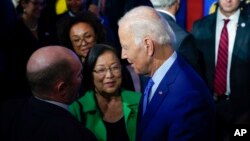At a White House summit Thursday aimed at combating division and hate-fueled violence throughout the United States, President Joe Biden railed against white supremacists and urged the nation to overcome its "toxic" political division.
The United We Stand Summit brought together local leaders, civil rights organizations, experts and community groups. The event honors communities that have experienced hate-based violence, the White House said.
Such violence includes a spate of mass shootings targeting places linked to specific groups: a Sikh temple in Wisconsin in 2012, a gay nightclub in Florida in 2016, and Asian spas in Georgia in 2021. Also noted: a shooting targeting Mexicans at a Texas supermarket in 2019 and one singling out Black people at a New York supermarket in May.
Kicking off the summit, Vice President Kamala Harris said the country is facing an "epidemic" of hate-fueled violence. "We have seen our neighbors, our friends, our loved ones attacked simply because of who they are or where they pray," she said.
In his remarks, Biden recounted the 2017 white supremacist rally in Charlottesville, Virginia, which he said was why he ran for office.
"White supremacists will not have the last word, and this venom and violence cannot be the story of our time," he said, urging the nation to choose "hope, unity and optimism" over "fear and division and hate."
Toxic division
A recent Economist and YouGov poll showed that 66% of Americans believed that political divisions in this country had gotten worse since the beginning of 2021, and 62% expected an increase in political divisions in the coming years.
Biden acknowledged the "toxic division" the country is facing.
"Hate-fueled violence is born in the fertile soil of a toxic division," he said. "We won't solve the problem by going after the extreme fringes alone. We have to confront the ways in which our toxic division fuels this crisis for all of us. Our differences certainly don't turn a fellow American into a sworn enemy."
His critics argue that Biden himself is fanning the flames of division as he ramps up attacks in recent weeks against so-called MAGA Republicans, invoking harsh political rhetoric that includes accusing them of "semi-fascism." MAGA is an acronym for "Make America Great Again," former President Donald Trump's well-known 2016 campaign slogan, which now is used to refer to his hard-core followers.
"If he wants to find the main cause of division in America today, he should look in the mirror," tweeted Republican Senator Tom Cotton.
Earlier this month, Biden delivered a speech in Philadelphia warning of the dangers MAGA Republicans pose to democracy and how Trump's "extreme ideology" threatens the "very foundation of our republic."
An Ipsos/Reuters poll conducted after the Philadelphia speech showed that more than half (59%) of Americans believed his speech would only serve to further divide the country, while 41% believed it would unite it.
White House press secretary Karine Jean-Pierre did not directly respond when asked about criticism that Biden is fomenting division.
"The president is hosting this event to highlight that the vast majority of Americans, despite our myriad of differences, are united in opposition to hate-fueled violence," she said.
While 84% of Americans polled in the Ipsos survey said political violence was unacceptable, many are becoming more disillusioned about the prospect of national unity. The Economist and YouGov poll showed 60% anticipated an increase in political violence, with 57% saying it was likely to culminate in a civil war.
Increase in hate crimes
According to the FBI's 2020 Hate Crime Statistics, the most recent data available, the overall number of reported incidents increased by 949 from 2019. Law enforcement agencies reported 8,263 criminal incidents in 2020, as determined by submitted reports, and the number of victims exceeded 11,000. Of the victims, 62% were targeted because of the offenders' bias toward their race, ethnicity or ancestry, which continues to be the largest bias motivation category.
Many factors contribute to the increase in hate crimes, including pandemic-related stress and hostile political rhetoric, said Phyllis Gerstenfeld, professor of criminal justice at California State University, Stanislaus and author of Hate Crimes: Causes, Controls, and Controversies.
"When people hear leaders openly spouting white supremacist material, that can inspire some people to threats and to violence," she told VOA. "That's been a major factor for the last six years, where we hear mainstream politicians saying things that are completely in line with what white supremacists and other extremists are saying.”
The administration is launching initiatives to strengthen resources for schools, law enforcement agencies and cultural institutions to prevent and respond to hate-fueled violence and foster dialogue in communities. It is partnering with philanthropic and community organizations, as well as technology companies, including YouTube, Twitch, Microsoft and Meta, which are announcing actions to prevent hate-fueled violence.
Since there's very little research on the best way to prevent hate crimes, it will be difficult to determine whether the administration's actions will make a difference, Gerstenfeld said. Still, it was important for the president to use his bully pulpit to call out bigotry, said Brian Levin, director of the Center for the Study of Hate and Extremism at California State University, San Bernardino, who participated in the event.
Levin told VOA the summit was a good opportunity to scale up expertise from local community advocates to high government officials.
"The key is sustaining these efforts at the local level and assisting these communities with state and federal guidance when necessary."
